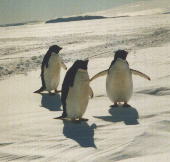

POINT REYES BIRD OBSERVATORY 4990 Shoreline Highway Stinson Beach, CA 94970 Newsletter 79 Winter 1987-88 TIME ON ICE by Janet Kjelmyr Much has been written about exploring Antarctica, about the arduous and sometimes tragic expeditions, about the immense scientific endeavors, and about the politics involved in maintaining peaceful coexistence within the international Antarctic community. There are some things, however, that are seldom written, and they are the ones that I am most often asked. Simply, what is it like to live in Antarctica? For Geoff Geupel and me, home for the four months from October through January is a 12-by-16-foot wooden field hut with an adjoining entry hall and storage room, situated on the shores of Admiralty Bay, King George Island. We share this narrow strip of ice-free rock with about 18,000 breeding penguins -- Adelies, Gentoos, and Chinstraps -- and our nearest neighbors live three miles away at Arctowski Station. Our arrival on King George Island is staggeringly definitive. There are no roads out. As far as we're concerned, the rest of the world has disappeared. We quickly rearrange our priorities, and the borderline between necessity and luxury becomes cloudy. As Antarctic explorer Richard E. Byrd remarked in ALONE, "It occurred to me that half the confusion in the world comes from not knowing how little we need." We have a small generator that produces enough electricity for a few lights and a small heater. Mostly we rely on our Coleman heater and stove. We've become white gas junkies. Early in the austral summer we melt snow for all our water. By December we fill our water jugs at a small stream fed by glacial melt-water. Our diet is simple -- frozen meat, pasta, and canned vegetables. Fresh fruit and vegetables are a rare treat. Our outhouse affords an unparalleled view of the Bransfield Straits, but the raw truth is that visits to it in sub-freezing weather with icy gray gusts blasting everywhere can be quite unpleasant. We cross the glacier that separates us from Arctowski Station about once a week to shower, replenish our food and fuel, and relax in comfort. The Poles are fine people, warm and generous. They are our Antarctic family and make the isolation much less severe. Little news reaches us. When it does, it is old and stale. Recently our life has been complicated by the addition of a short-wave radio. It brings us friendly voices and sensational stories form all corners of the globe. Sometimes it's comforting to know that the world goes on without us, although our interest in the overall big picture diminishes. Our work, the weather, and the food are more important than the world at large. One does not live here without being touched by the uniqueness of the environment. Once immersed in these austere surroundings, perception changes. It has unquestionably changed my life. On many days what I know about Admiralty Bay is concise: wind, snow, birds, seals, and air as crisp as chilled vodka. Sometimes it's sapphire water and sky; sometimes emerald water and pale sky; sometimes glassy gray water and ashen sky just before a storm. Visibility can shift suddenly from complete obscurity to startling clarity. The weather changes hourly. A calm can be followed by a squall of icy rain, followed by a sunburst that turns the sea fog orange. Ivory glaciers sown with crevasses gently roll across the land until they abruptly meet the sea in magnificent ice cliffs. The wind can sing. It can also howl and scream. We have grown accustomed to the sounds of wind, surf, penguins, skuas, and elephants seals, until they become another form of silence. The night is so short as to be practically nonexistent. Light lingers, and the boundary between days becomes vague and the notion of time intangible. With the passage of days the reality of life at home becomes more distant, and the cold and solitude join to produce nostalgia. One turbulent gray day as the ocean's surface tossed about angrily and a storm swept upon us, I dreamed of the sun's heat burning through a thick coastal fog, the smell of Douglas fir after a spring rain, and my dog turning in her circles as she lay down in the shade. I have felt a like nostalgia in California, dreaming of the crash of weather and the polar sea, of jade-colored icebergs dotting the ocean, and of diamond light dancing on Antarctic water. Here, memories come tumbling up as I work, read, or sleep. Strange how certain details become so vivid. Holidays can be especially melancholy. I miss family, friends, familiar places, turkey with all the trimmings, and the endless confusion that occurs when people gather. A curious state of suspension sets in. Often I do nothing but look and listen. I can't describe this privilege of simplicity, this luxury of peace. But the isolation sometimes overwhelms me. Everything goes along fine for a time, then the mood suddenly quivers and becomes fragile. Time bites, like the cold. (Janet Kjelmyr and her husband Geoff Geupel, both of PRBO's research staff, joined Wayne Trivelpiece's team in Antarctica in 1984. The penguin study on King George Island in the Antarctic Peninsula expanded that year to include a rookery located about three miles from the Polish research station, Henry Arctowski. While encamped at the remote field location last year, Janet composes this sketch of Antarctica. -- Editor)